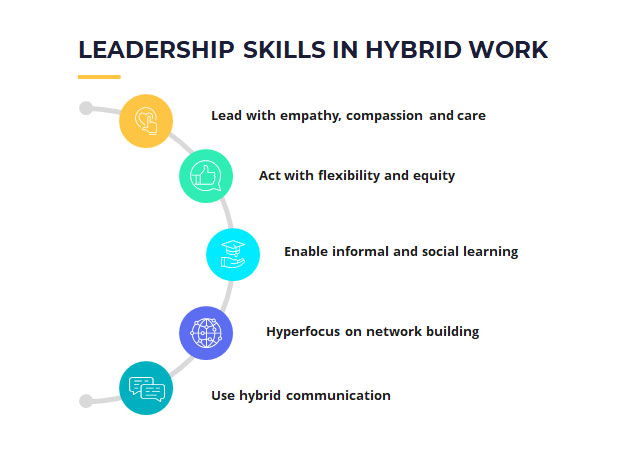Leadership skills to navigate the new working world



The working world has changed dramatically in recent times, with the pandemic driving a shift to remote and hybrid working. Many teams are now spread out across disparate locations and employees may rarely meet colleagues and managers in person.
This trend toward more virtual workforces, with fewer in-person touchpoints, has put leadership skills in the spotlight. Gone are the days when managers could simply call over a desk to check on the status of a project, or glance across the room to note the mood and energy of team members.
So, what does the modern work landscape look like, and what skills do leaders need to be effective in it? In our recent webinar, ‘Leadership skills to navigate the new working world’, we investigated these questions with:
Here, we provide some highlights from the discussion. For a more in-depth discussion around your hiring needs or your next career step, get in touch with the team today.

Although many economies are predicted to struggle as we enter 2023, the labour market has been buoyant in recent months, with a post-pandemic boom in hiring. Graham noted that the unemployment rate remains at historic lows, and an extremely candidate-short hiring market has emerged.
The reasons for this are various. One is Brexit, which has shrunk the pool of candidates from abroad. Another key factor is the ongoing impact of the pandemic – Graham pointed that over one million workers are estimated to have left the UK payroll since its onset.
With so much choice available to them, many workers have re-evaluated their careers, culminating in the phenomenon referred to as the ‘Great Resignation’. Professionals across almost all sectors are increasingly looking for employers who offer flexible working and strong people propositions, especially around equity, diversity, and inclusion (ED&I).
To help viewers understand how to meet these expectations, the panel discussed the key pillars of effective leadership in hybrid workplaces:


During the webinar, Liz highlighted the need for modern workplace leaders to exhibit and practice empathy, compassion, and care for their people.
What does this mean in practice? Well, if you are a leader or an aspiring leader, it means connecting with employees in a human way, while being relatable. But remember that you can’t make people feel motivated and engaged. All you can do is create an environment which generates engagement naturally.
This begs the question: what makes a working environment truly engaging? Here are four key enablers:
With both flexible working and ED&I so prominent on today’s business agenda, it might seem hard to know where to start, and which to focus on. But in truth, the two are closely intertwined: a truly inclusive environment is inherently flexible, and a flexible environment will find it that much easier to attract and retain diverse talent.
Liz noted that after the pandemic caused such a massive dislocation of our ways of working, many workers have struggled to re-engage with the world of work. This is especially the case for workers from underrepresented groups, such as ethnic minorities, women, the neurodiverse, older workers, and younger workers.
We do know, however, that these groups have a strong preference for flexible and hybrid working. This presents an opportunity for employers to access new and underutilised talent pools by promoting themselves as flexible and inclusive employers.
One of the most significant but underdiscussed challenges that the pandemic has created for workers is the break it forced in learning and development journeys. Many now feel that their professional growth has been on hold for the past two years.
Liz commented that being an effective leader in a post-pandemic world means addressing this and going above and beyond to help your people make up for lost time. It also means understanding flexible learning and the different forms it can take. For instance, flexible learning might include:
Alongside a renewed focus on learning and development, both employers and candidates will benefit from the creation of professional networks. With the support of leaders, these networks can provide mutual learning opportunities for professionals from different backgrounds, while also reinforcing connections within teams and between teams.
Communication has always been key to success for all organisations - but it became clear during the webinar that our understanding of what constitutes effective communication has changed massively since the onset of the pandemic. With hybrid working now the norm and employee engagement becoming a top priority, leaders need to be thinking hard about whether their approach to communication is moving with the times.
While remote working has created distance between teams, the technology involved has also made it easier than ever for remote teams to communicate and collaborate. Colleagues don’t have to share the same office or even the same time zone to work together successfully.
The next step is for leaders to take charge of streamlining this process and take advantage of these new opportunities. For instance, in organisations with hybrid working, office spaces could be redesigned to better facilitate collaboration and reflect preferred ways of working. Successful teams communicate, and the better they are able to communicate, the more successful they will be.
Workplace culture is one of the most important factors in talent retention. And while it is hard to measure and manage, getting it right will have a massive impact on your overall success. Culture is what brings people together, making it all-important at a time when so many are reconsidering their roles and moving on.
So, what does an effective culture look like? Each one is different, but Steph identified a few key traits:
Steph noted that another critical element of a strong workplace culture is the capacity for colleagues to learn from one another. How can leaders ensure that this isn’t damaged when workers aren’t in the same physical spaces?
Here are four strategies that help many hybrid working employers to encourage learning:
At the end of the session, the audience had the opportunity to ask the speakers a series of questions. Here are some of the highlights:
Liz: Don’t just do the instinctive thing and talk to the person next to you rather than the person who’s working remotely. Think through your interactions and make sure you’re doing what you can to level the playing field between those who are in office and those who aren’t.
 Steph: I saw a quote recently which describes the situation well: “If you don’t intentionally include, you will unintentionally exclude”. Remember that those who are in the office less often will likely be carers, parents, those with disabilities or who are neurodivergent, and those who live far away. Think of all the talent you could potentially be excluding if you are biasing those in the office.
Steph: I saw a quote recently which describes the situation well: “If you don’t intentionally include, you will unintentionally exclude”. Remember that those who are in the office less often will likely be carers, parents, those with disabilities or who are neurodivergent, and those who live far away. Think of all the talent you could potentially be excluding if you are biasing those in the office.
Liz: It depends on an organisation’s journey and how they are trying to develop their employees. There’s a big lack of candidates on the job market right now, so learning and development, and training early in people’s career, are key. Companies also need to invest in leadership and management. We are focusing more than ever on problem-solving and collaboration skills.
In such a challenging hiring market, employers that truly understand the candidate market will have the most success with their talent acquisition. At PageGroup, our consultants are true experts in hiring and can give you all the insights you need to build a high functioning team.
If you are an employer and would like to talk to us about your current recruitment needs, fill in the form below and one of our consultants will call you back.
IMPORTANT: By submitting your email address and any other personal information to this website, you consent to such information being collected, held, used and disclosed in accordance with our PRIVACY POLICY and our website TERMS AND CONDITIONS.
If you would like to talk to us about your current recruitment needs, fill in the form below and one of our consultants will call you back.